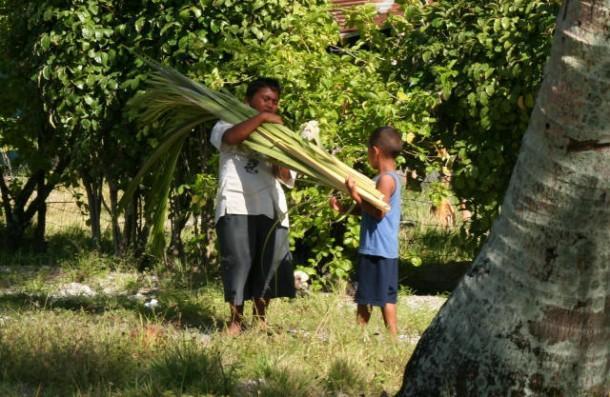“Protecting these forests and jobs require a delicate balance between retaining a market for palm fronds and encouraging sustainable harvest practices.”
Justice and Care for Creation
Care and justice for all creation is a core value of most Christian denominations. Eco-justice ministries seek to heal, defend, and work toward justice for all God’s creation and to respect the kinship and connection of all that God created through education, advocacy, and action. Palm Sunday offers an opportunity for churches to put this value into action.
The harvest of palm products is an important source for many tropical families and communities. Over-harvesting can threaten the livelihood of these communities as well as the forests where the palm plants thrive. Similarly, decreased harvesting caused by reduced market demand could have a detrimental effect because forests that no longer provide a source of palm income are at risk of destructive conversion to large agricultural fields or pasture. Protecting these forests and jobs require a delicate balance between retaining a market for palm fronds and encouraging sustainable harvest practices.
An effort to certify palm fronds from communities practicing sustainable forestry is currently underway. These communities have taken it upon themselves to utilize harvesting practices that minimize the impact on the natural ecosystem. Through certification, communities engaging in responsible management practices have the opportunity to benefit directly by receiving a higher price for their palm fronds. Consumers can be confident that their purchase directly benefits responsible harvesters.
Did You Know?
- Approximately 308 million palm fronds were consumed in the United States in 1998.
- Palm purchases for Palm Sunday may be worth up to 4.5 million dollars/year.
- A congregation of 1,100 to 1,500 members will order approximately 700 palm fronds for Palm Sunday services.
- Palm gathering actually protects valuable natural forests.
- At least half of the farmers in the Central Peten of Guatemala earn additional income from harvesting fronds and, more than a quarter of household heads support themselves exclusively by collecting fronds.
- Each palm plant produces 2 to 5 harvestable leaves over a 2 to 4 month period.
Why should your church consider Fair Trade Palms?
- Harvesting palms is an important source of income but gatherers receive a low price. Gatherers will receive a higher price for their “fair trade” palms improving their income. This promotes social justice.
- Palms protect valuable natural forests because they provide income to forest communities. Palms will be “sustainably” harvested and managed protecting the palms and the forests they need for shade. This promotes environmental stewardship.
- To improve income and living conditions for the communities gathering the palm and to protect the palms and the important forests from which they are gathered through sustainable harvest programs. This is what “Fair Trade” is all about.
The North American Commission for Environmental Cooperation (NACEC) and the University of Minnesota Center for Integrated Natural Resources and Agricultural Management (CINRAM) worked together with the Rainforest Alliance TREES program and Smartwood to ensure that palms from the forests of Mexico and Guatemala were harvested sustainably.
Partnerships with wholesaler Continental Floral Greens and distributor Hermes Floral have enabled Eco-Palms to be distributed throughout the United States for Palm Sunday. In addition, partnerships with faith-based organizations such as Lutheran World Relief (LWR), United Methodist Committee on Relief (UMCOR), The Episcopal Church (DFMS) and the Presbyterian Church of the United States (PCUSA) have helped expand awareness of the Eco-Palms program. You can learn more about how to order your palms here.
Information for this article was obtained from the Center for Integrated Natural Resources & Agricultural Management.

